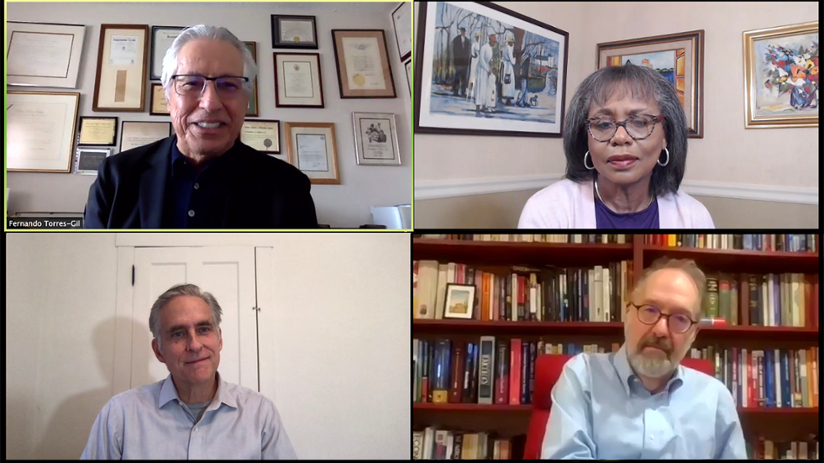
By Bethany Romano, MBA’17
“Every four years, we tend to say, ‘this is the most important election of our lifetimes,’ but this time, it truly feels different,” said Dean David Weil in his opening remarks during “The Act of Democracy,” a special Election 2020 Conversation with the Dean. The event, held over Zoom one week before Election Day, featured panelists Anita Hill, university professor at Brandeis; Daniel Kryder, the Louis Stulberg Chair in Law and Politics at Brandeis; and Heller alumnus Fernando Torres-Gil, MSW’72, PhD’76, professor of social welfare and public policy at the Luskin School of Public Affairs at UCLA.
To kick off the conversation, Weil asked each panelist to reflect on a quote by the late Congressman John Lewis, which inspired the title of the event: “Democracy is not a state. It is an act, and each generation must do its part to help build what we called the Beloved Community, a nation and world society at peace with itself.”
Torres-Gil spoke about his undergraduate students at UCLA, saying “They’re a very diverse population under tremendous stress. They wonder if this democracy is relevant to them. It feels like the world is falling apart for them. I want us to think about rebuilding community, bringing back our sense of civic bonds to a whole new demographic of society.
Kryder added, “Our democracy is complicated, and fragile. Scores and hundreds of individual elections across the country will occur next week. There are many roles one can play in a democracy. Voting is perhaps the most obvious one.” Congressman Lewis, he noted, acted out many roles in our democracy: early on as a community organizer and activist, and through protest, and later by running for public office, and by supporting an independent press. “Democracy takes all of these forms,” Kryder said.
To frame her response, Hill shared an clip from a recent ABC News Town Hall, in which University of Pittsburgh senior Cedric Humphrey asked Joe Biden what he has to say to young Black voters disappointed in a system they feel has failed to protect them. Is voting enough or is it pro forma? she asked.
“I keep coming back to the question of why do we vote, if it doesn’t matter?” said Hill. “It’s a problem of cynicism. That has become a real barrier.” Hill went on to note the many lawsuits currently being fought over voting access and voter suppression, and a 2013 Supreme Court ruling that invalidated a key section of the Voting Rights Act.
“The idea that a group can maintain power by shrinking our democracy is a clear and present danger, an ongoing danger,” said Hill.
To wrap up, Dean Weil asked each panelist to share something that gives them hope. Kryder said that he turns to U.S. history for hope and inspiration, citing the “endless supply of creative resistance” he finds there. “I’m sure we’re going to enter into a new phase of this with this election.”
Torres-Gil shared the story of his grandmother, who came to the U.S. illegally, escaping war and poverty, to eventually became a U.S. citizen at age 65. “Despite all the terrible things she and others have gone through, she had hope,” he said.
Hill closed the event with her source of hope, and a moment of perspective. “When I was much younger, just out of law school, I used to think the struggle for equality, for a better democracy, was a sprint. Then I got a little bit older and I started thinking no, it’s a marathon. But now I think, it’s actually a relay. It passes on from generation to generation. And somehow, someway, we find a way to be involved. And that gives me hope.”
